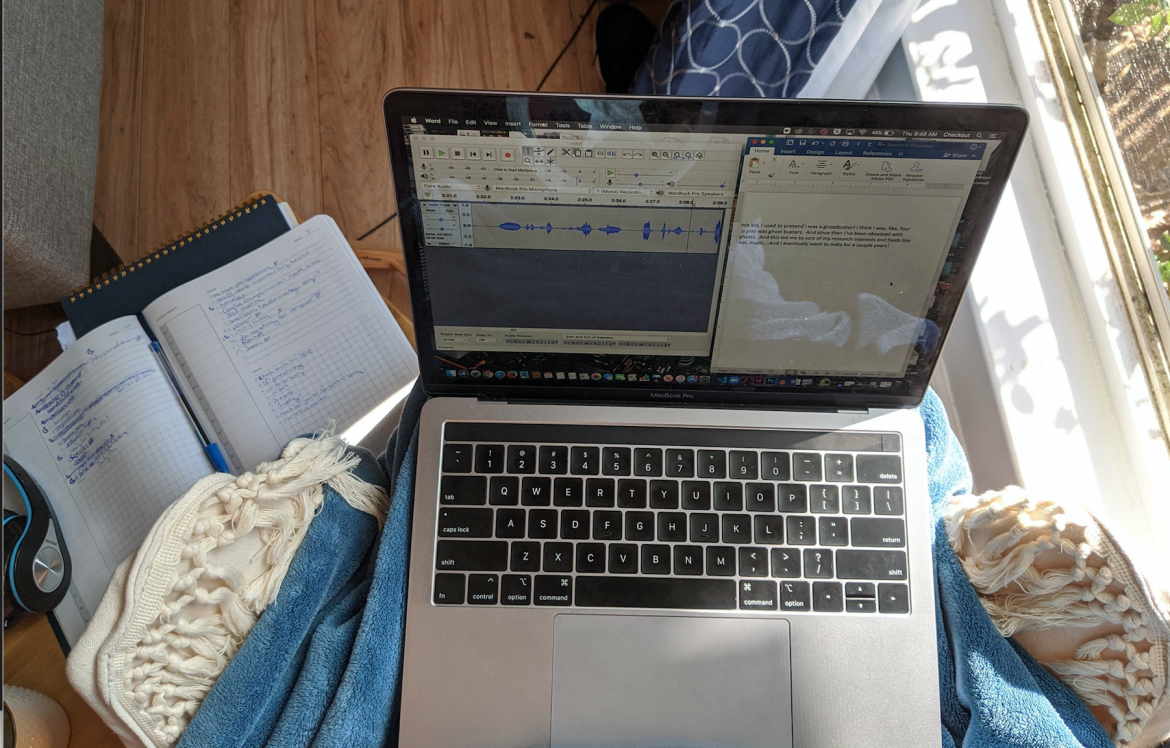I have so many stories to tell, interviews to share, and pictures of MTSU to show off, and I’ll be producing many of those for you very soon. I promise.
But first, I was hoping I could check in with you.

Darby McCarthy (Photo: Submitted)
I’m sorry for my absence. This isn’t what you’ve come to expect from me. I’ve been sorting through my personal life, my work life, and my school life, and everything is a bit of a crazy mess. Even though the specifics of “crazy mess” is different for each of us, I have a feeling that the general sentiment is one we all share. This year has been… a whirlwind.
Last semester, I introduced myself to you by sharing the advice I wished I could have given to Freshman me.
Now, I want to share something similar but even more pertinent. We’re fast approaching the anniversary of the official declaration of the pandemic in 2020, and there are already so many things I’ve learned about how to survive college in this new, unorthodox way.
Some of the advice will sound like it could apply even if school were not online – and it probably could – but these nine tips have been, to my perspective, some of the most useful to keep in mind during the online process.
Get your body moving and give it natural light.
Go outside. Open a window. You are a living thing, and being stuck inside for most of the school day now involves much less walking from class to class. If you have a dog or a bike, take it out around the block. If it’s been raining for three days straight, have a dance party in your room and take some vitamin D. Trust me, you need it, and whether consciously or subconsciously, you will notice huge improvements in your mood and attitude.
Assign yourself study hours.
Treat school like an hourly job. Calculate how much time you have in your week to spare, and then create a block schedule for your hours of studying. Dedicate those hours to school, resisting distractions such as social time, video streaming services, and games. If you have to turn your phone off – a terrifying concept, I know – then, do it. Now that things have been focused online, our classes involve exponentially more reading. Discussion posts, D2L posts, homework assignments, textbooks… there’s a lot to take in. You can’t watch a movie in 10 minutes, and you can’t do all your necessary reading without devoting an appropriate amount of time to it. Over-plan for it so that finishing early feels like a treat, and running out of time will be less likely.
Assign yourself sleep hours too.
Losing sleep in the pursuit of knowledge will happen, but consistently forgetting to get any winks will have a very negative impact on your psyche. You’ll burn out, you’ll retain less, you’ll be more susceptible to depression and negative biases. I assume you don’t want that.
Don’t make mountains out of molehills.
The instinct to catastrophize seems ever more exacerbated by the remote class framework and the “newness” of many of the implemented changes in standard operating procedures. There are lots of things on your plate right now, and they are all staring you in the face at once. If you like being stared in the face by your obligations, I suggest making lists and organizing the way that you take it all in. But if you panic at the full amount on sight, (as I have this semester), then you most need to focus on setting aside chunks of time for concentrated, dedicated effort to the things you must tackle. The name of the game here is “compartmentalizing.”
Eat the elephant one bite at a time.
While you’re staring at the list of things you have to do, remember that it is impossible to do everything all at once. The old saying goes: “how do you eat an elephant? One bite at a time.” It’s a reminder that even those relatively smaller tasks need to be laboriously chipped away. Don’t tell yourself that everything can be done in one big sweep at the last minute. That is called procrastinating, and it is one of the most impossible habits to have if you intend to graduate. If you’re able to procrastinate until your diploma, I can’t imagine your experience was as fulfilling, educational, or as pleasant as it could otherwise have been.
Communicate.
I’ve said it before, and now in a new context, I’ll say it again. The key to solving a lot of problems is open discussion of them. This is very difficult because it requires you to swallow your pride and admit where you’re struggling.
Swallow your pride.
If you’re struggling, it is very important to identify how and why, but how and why are not the whole equation. If you can’t discuss all of your problems, then you can’t discuss all of the solutions available to you. The resource you choose to confide in could be any number of the available and affable staff provided by our university. MTSU offers counselors and advisors, but it’s often easiest just to communicate directly with the individual professors of your classes. I have yet to be met with hostility for requesting a Zoom meeting. It is always welcomed.
Don’t give up.
Sometimes, you hit a wall. Sometimes you hit it hard. Whether that is burnout, or a series of medical emergencies, or compounding factors in your personal life – sometimes life deals you a rough hand. And you’ll be in the middle of your semester thinking, “how am I going to recover from this?” Listen to me: the fact that you’re asking means that you want to recover. The way to do that is to not surrender. Any amount of effort is better than nothing. This will always be true – in work, in school, and in life. Pick yourself up after you fall.
Have faith, hope, belief, and trust in yourself.
You’re in school because you want to accomplish something. You want to be someone, go somewhere, do something. You want to help others, or make money, or create a legacy. Whatever your goals – and whether you’ve figured them out yet or not – you’re here. So, you might as well allow that positive little seed to burrow into your brain: you’re going to do the things that will fulfill you. It will take hard work, but hard work is worth doing if you believe in the reasons you’re doing it.
We’re all figuring out what this remote learning process looks like for one another. Your professors graduated college, but not during a pandemic. They want you to work hard and to succeed, but they want to be confident they’re giving you the tools and resources you need to be able to do that.
Hopefully, most of us won’t have to keep learning this way for much longer.
Thanks for pushing through and working hard. Thanks for caring. Thanks for reading. You’ll hear more from me very soon.
Author Darby McCarthy is currently an undergraduate student at MTSU, majoring in Journalism in the College of Media and Entertainment. The views and opinions expressed above are her own.


COMMENTS ARE OFF THIS POST